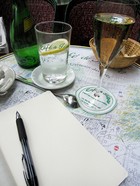Why Paris?
- SUBSCRIBE
- ALREADY SUBSCRIBED?
BECOME A BONJOUR PARIS MEMBER
Gain full access to our collection of over 5,000 articles and bring the City of Light into your life. Just 60 USD per year.
Find out why you should become a member here.
Sign in
Fill in your credentials below.
 Allen Ginsberg referred to the “…bewildering beauty of Paris…”
Allen Ginsberg referred to the “…bewildering beauty of Paris…”
But that falls within the category of the obvious, doesn’t it?
Hemingway, in looking back on his early years in Paris said “To have come on all this new world of writing, with time to read in a city like Paris where there was a way of living well and working, no matter how poor you were, was like having a great treasure given to you.”
When Katherine Mansfield arrived in 1913, she wrote to a friend, “I am going to enjoy life in Paris I know. It is so human and there is something noble in the city…It is a real city, old and fine and life plays in it for everybody to see.”
James Joyce found Paris a good place to work. “There is an atmosphere of spiritual effort here,” he wrote. “No other city is quite like it. It is a racecourse tension. I wake early, often at 5 o’clock, and start writing at once.” Jessie Fauset said, “I like Paris because I find something here, something of integrity, which I seem to have strangely lost in my own country. It is simplest of all to say that I like to live among people and surroundings where I am not always conscious of ‘thou shall nots.’”
For Lawrence Durrell, it was the French. “The national characteristics…the restless metaphysical curiosity, the tenderness of good living and the passionate individualism. This is the invisible constant in a place with which the ordinary tourist can get in touch just by sitting quiet quietly over a glass of wine in a Paris bistro.” In 1963, Katherine Anne Porter wrote to Flannery O’Connor describing “the great carnival of mourning” for Edith Piaf and Jean Cocteau and noted, “It was real! They died as they had lived, with style and grace and their proper eccentricity; and Paris loves anybody who can live anarchically and be delightful entertainment at the same time.” She added, “So do I.”
“America is my country, and Paris is my home town,” Gertrude Stein proclaimed, and for many American writers her words ring deep and true. But again, why?
The answer to that question may well lie in something else Stein said: “It was not what France gave you, but what it did not take away.”
Stein was not the sort of writer who was given to explaining her grand pronouncements, but I think I know what she meant. I think at least part of what she was saying may have been akin to what Henry James was talking about when he wrote that “…the great merit of the place is that one can arrange one’s life here exactly as one pleases…there are facilities for every kind of habit and taste, and everything is accepted and understood.”
Surely that famous French “live and let live” philosophy was also part of the appeal for James Baldwin, who arrived in Paris worn out by the difficulty of living in a country where his race, his sexuality, and his choice of career were all treated with contempt. “An American writer fights his way to one of the lowest rungs on the American social ladder by means of pure bullheadedness and an indescribable series of odd jobs,” he wrote. “…In Europe [he] feels—almost certainly for the first time in his life—that he can reach out to everyone, that he is accessible to everyone and open to everything. He feels, so to speak, his own weight, his own value. It is as though he suddenly came out of a dark tunnel and found himself beneath the open sky.”
“What did I get out of my two years in Paris?” V. S. Pritchett wrote, looking back in his memoirs. “Freedom above all and love of it has never left me. Self-confidence, too…Above all, I had had feckless pleasure, a thing suspected by the calculating, constrained and anxious lower middle-class from which I came.”
Freedom. Excitement. Tolerance. Appreciation for sensual pleasures and the arts. All of these gifts Paris gives are important. But perhaps for many people—writers and everyone else, too—at least part of the answer to the question “Why Paris?” really does come down, more often than not, to the obvious.
“A final reminder,” wrote Kate Simon in her guidebook to Paris in 1967. “Whenever you are in Paris at twilight in the early summer, return to the Seine and watch the evening sky close slowly on a last strand of daylight fading quietly, like a sigh.”
Maybe the question, really, is why not?
Janet Hulstrand is a writer, editor, and teacher of literature and writing based in Silver Spring, Maryland. Each summer she teaches “Paris: A Literary Adventure,” for the Education Abroad program at Queens College of the City University of New York. You can read more about Paris and other places on her blog, “Writing from the Heart, Reading for the Road,” www.wingedword.wordpress.com.
More in Bonjour Paris, Paris, Paris cafes, Paris history, writers in Paris




